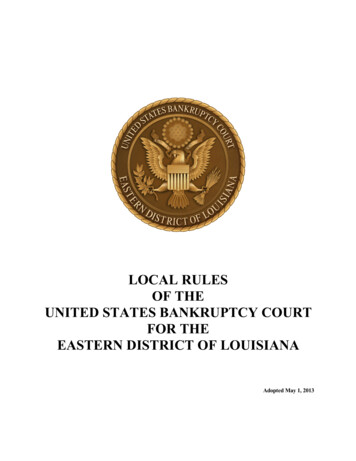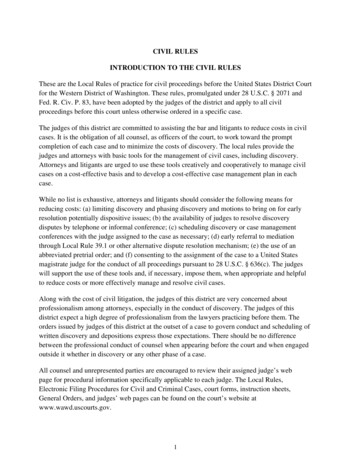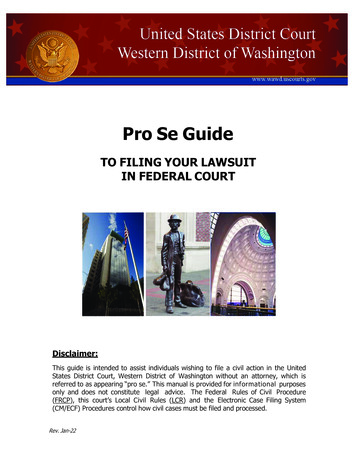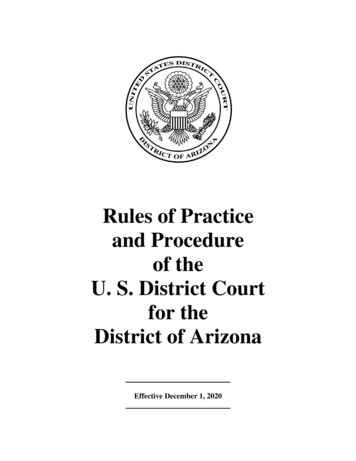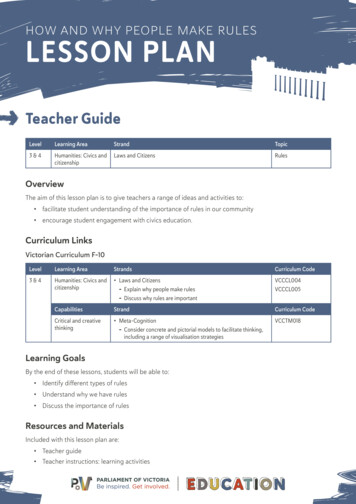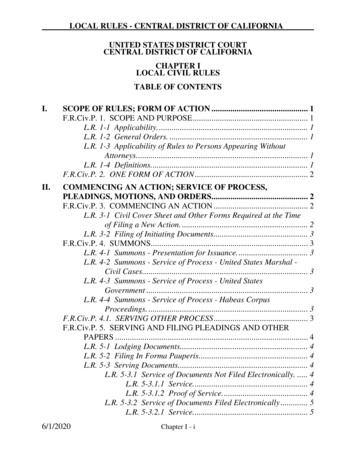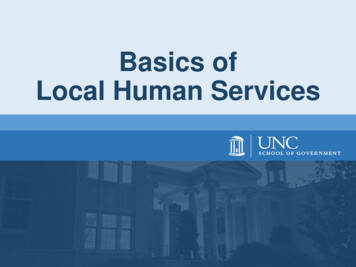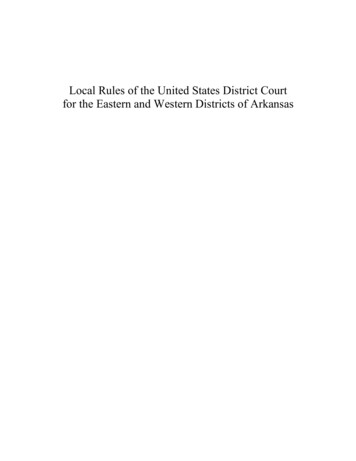
Transcription
Local Rules of the United States District Courtfor the Eastern and Western Districts of Arkansas
ContentsLOCAL RULE 4.1 SERVICE OF PROCESS . 4LOCAL RULE 4.2 COSTS AND BONDS . 5LOCAL RULE 4.3 BONDSMEN . 6LOCAL RULE 5.1 FILING OF DOCUMENTS BY ELECTRONIC MEANS. 7LOCAL RULE 5.4 TIME FOR FILING UNDER FEDERAL RULES OF CIVIL PROCEDURE 5 (d). 8LOCAL RULE 5.5 PLEADINGS AND FILINGS . 9LOCAL RULE 6.2 EXTENSION OF TIME TO PLEAD . 11LOCAL RULE 7.2 MOTIONS . 12LOCAL RULE 7.3 COMMUNICATIONS WITH COURT . 14LOCAL RULE 7.4 STIPULATIONS BY COUNSEL . 15LOCAL RULE 7.5 CONTINUANCES . 16LOCAL RULE 9.1 COMPLAINT FORMS FOR ACTIONS BY INCARCERATED PERSONS . 17LOCAL RULE 16.1 INITIAL SCHEDULING ORDER . 18LOCAL RULE 16.2 EXEMPT ACTIONS . 19LOCAL RULE 23.1 CLASS ACTIONS . 20LOCAL RULE 26.1 OUTLINE FOR FED.R.CIV.P. 26(f) REPORT . 22LOCAL RULE 26.2 OUTLINE FOR FED.R.CIV.P. 26(a)(3) PRETRIAL DISCLOSURE SHEET . 23LOCAL RULE 33.1 INTERROGATORIES AND REQUESTS . 24LOCAL RULE 40.1 ASSIGNMENT OF ACTIONS AND PROCEEDINGS . 25LOCAL RULE 41.1 NOTICE OF SETTLEMENT . 28LOCAL RULE 47.1 CONDITIONS FOR JUROR CONTACT . 29LOCAL RULE 54.1 ATTORNEY'S FEES. 30LOCAL RULE 56.1 SUMMARY JUDGMENT MOTION . 31LOCAL RULE 58.2 SATISFACTION OF JUDGMENTS . 32LOCAL RULE 67.1 DEPOSIT OF REGISTRY FUNDS BY THE CLERK IN INTEREST-BEARING ACCOUNTS. 33LOCAL RULE 71A.1 LAND CONDEMNATION PROCEEDINGS . 35LOCAL RULE 72.1 UNITED STATES MAGISTRATE JUDGES . 37LOCAL RULE 77.1 LOCATION AND OFFICE HOURS OF CLERKS' OFFICES, AND DESIGNATION OF FILINGOFFICES . 42LOCAL RULE 79.1 REMOVAL OF FILES OR WITHDRAWAL OF PAPERS AND EXHIBITS . 44LOCAL RULE 83.1 UNITED STATES BANKRUPTCY JUDGES . 45LOCAL RULE 83.2 PHOTOGRAPHING, BROADCASTING, TELEVISING, AND RECORDING IN COURTROOMAND ENVIRONS . 46LOCAL RULE 83.3 WEAPONS IN COURTROOMS . 47LOCAL RULE 83.4 MANDATE OF AN APPELLATE COURT . 48
LOCAL RULE 83.5 ATTORNEYS. 49LOCAL RULE 83.6 ASSESSMENT FOR OUT-OF-POCKET EXPENSES . 51LOCAL RULE 83.7 APPOINTMENT OF COUNSEL. 55LOCAL RULE 83.8 COMMUNICATIONS BY UNITED STATES ATTORNEY REGARDING PERSONSSENTENCED BY THIS COURT . 56APPENDIX Model Federal Rules of Disciplinary Enforcement . 57
LOCAL RULE 4.1SERVICE OF PROCESS(a)Counsel must prepare summons on the form provided by the Clerk. Counsel must prepare anyprocess that will be served by the United States Marshal, such as a writ of execution, and presentthat document to the Clerk.(b)After service of any pleading accompanied by a summons, counsel must promptly file proof ofservice using either the affidavit at the end of the Clerk's summons form or a separate affidavit ofservice. If service has been made by mail, counsel must attach the document showing receipt,such as the green card. When the United States Marshal serves any process, the Marshal mustpromptly file a return of service, including the document showing receipt if service was made bymail.Adopted March 2, 1981, and effective May 1, 1981Amended May 1, 1985Amended January 2, 1990Amended September 21, 2017
LOCAL RULE 4.2COSTS AND BONDS(a)Costs. Parties instituting any civil action, suit, or proceeding, whether by original action, removalor otherwise, shall pay to the Clerk the filing fee as required by the Judicial Conference of the UnitedStates. The Clerk will not accept for filing any tendered pleading for the institution of a civil actionwithout advance payment of the filing fee, unless the court shall order otherwise.(b)Bond for Costs. The Court, on motion or of its own initiative, may order any party plaintiff, eitherresident or nonresident, to file an original bond for costs or additional security for costs in such anamount and so conditioned as the Court by its Order may designate.Adopted and effective May 1, 1980Amended July 1, 1988Amended January 2, 1990
LOCAL RULE 4.3BONDSMENNo officer of either District Court, employee of the Department of Justice, or attorney at law shall beaccepted as surety on any bond or undertaking in any action or proceeding in either District Court.Adopted and effective May 1, 1980
LOCAL RULE 5.1FILING OF DOCUMENTS BY ELECTRONIC MEANSA person represented by an attorney must file electronically, unless nonelectronic filing is allowedby the court for good cause.Generally, the only exception to the mandatory electronic filing requirement are case initiatingdocuments (complaints, petitions, notices of removal and indictments). Additional exceptions in theEastern District are sealed records, Social Security Administrative Transcripts and any document that addsa party to an action.A person not represented by an attorney is generally not allowed to electronically file and mustsubmit paper for filing. Electronic filing is only permitted by court order.Adopted and effective May 26, 2005Amended December 1, 2018
LOCAL RULE 5.4TIME FOR FILING UNDER FEDERAL RULES OF CIVIL PROCEDURE 5 (d)Seven days is hereby construed to be a "reasonable time" after service within which papers shallbe filed under the provisions of Federal Rules of Civil Procedure 5(d).Adopted and effective May 1, 1980Amended November 10, 2009
LOCAL RULE 5.5PLEADINGS AND FILINGS(a)(b)(c)(d)(e)The original of all pleadings, motions, and other papers, together with two copies thereof, shallbe filed with the Clerk. All pleadings, motions, and other papers shall be typewritten, photocopied,mimeographed, or printed in type not less than elite, in double space, letter size, using only one sideof the page, and shall be filed by the Clerk unfolded and without manuscript covers. Attorneysshall take notice of case numbers assigned to each case and shall note such numbers upon allpleadings, orders, and judgments.Pleadings, motions, and other papers are to be filed as follows:(1)In the Eastern District, the Clerk maintains staffed offices at Little Rock, Pine Bluff, andJonesboro. In the Western District, the Clerk maintains offices at Fort Smith, Fayetteville,El Dorado, Texarkana, and Hot Springs. In civil matters, pleadings, motions, and otherpapers should be filed in the office of the Clerk designated in Local Rule 77.1 for theDivision in which the case is pending, but when a Clerk is unavailable, they may be filed inany office of the Clerk in the appropriate district.(2)Criminal matters in the Eastern District. All pleadings, motions, and other papers in allcriminal matters are to be filed in Little Rock.(3)Criminal matters in the Western District. All pleadings, motions and other papers incriminal matters in the Harrison Division shall be filed in Fayetteville. Otherwise, allpleadings, motions, and other papers in criminal matters for a particular division are to befiled in that division.(1)Parties represented by counsel. Every pleading, motion, or other paper (except a pro semotion to discharge an attorney) filed in behalf of a party represented by counsel shall besigned by at least one attorney of record in his or her individual name, and the attorney'saddress, zip code, and telephone number, and Arkansas Supreme Court identificationnumber, or other Supreme Court identification number, if applicable, shall be stated. It isthe duty of each attorney to promptly notify the Clerk and the other parties to the proceedingsof any change in his or her address.(2) Parties appearing pro se. It is the duty of any party not represented by counsel to promptlynotify the Clerk and the other parties to the proceedings of any change in his or her address,to monitor the progress of the case, and to prosecute or defend the action diligently. Aparty appearing for himself/herself shall sign his/her pleadings and state his/her address,zip code, and telephone number. If any communication from the Court to a pro se plaintiffis not responded to within thirty (30) days, the case may be dismissed without prejudice.Any party proceeding pro se shall be expected to be familiar with and follow the FederalRules of Civil Procedure.At the time of filing a civil action, the plaintiff shall complete and submit a cover sheet statementon Federal Form No. JS44.A party who moves to amend a pleading shall attach a copy of the amendment to the motion. Themotion must contain a concise statement setting out what exactly is being amended in the newpleading – e.g. added defendant X, adding a claim for X, corrected spelling. Any amendmentto a pleading, whether filed as a matter of course or upon a motion to amend, must, except by
leave of Court, reproduce the entire pleading as amended, and may not incorporate any priorpleading by reference. The party amending shall file the original of the amended pleading withinseven (7) days of the entry of the order granting leave to amend unless otherwise ordered bythe Court. The requirements for amending pleadings set forth in this subsection of Rule 5.5shall not apply to parties proceeding pro se.Proposed findings of fact and conclusions of law, trial briefs, and proposed jury instructions shallbe submitted to the judge to whom the case is assigned, with copies served upon all other parties.(a)(b) and (d) Adopted and effective May 1, 1980(c) Adopted and effective March 14, 1984(e) Adopted and effective July 16, 1980(f) through (j) Adopted and effective June 26, 1981(g) Amended October 27, 1986 Amended July 1, 1988Amended January 2, 1990Amended and effective December 1, 2000Amended and effective April 30, 2007Amended and effective September 20, 2007Amended November 10, 2009
(a)(b)LOCAL RULE 6.2EXTENSION OF TIME TO PLEADIf the time originally prescribed has not expired and if all counsel consent in writing, the Clerk mayenter an order extending for not more than twenty-one (21) days the time to file a responsivepleading or to respond to discovery. The Court may suspend, alter, or rescind the order on its ownmotion or upon the motion of a party. All other extensions of time shall require approval by theCourt, except that when the appropriate judge is not available, approval may be granted byanother judge or a magistrate judge.In every motion for a continuance, every motion for any extension of time, or for leave to do anyact out of time, the motion shall state that the movant has contacted the adverse party (orparties) with regard to the motion, and also state whether the adverse party opposes or does notoppose same. If any such motion does not contain the statements required by this rule or,alternatively, a statement setting forth extraordinary circumstances which make it impracticable tocontact the adverse party (or parties), the motion may be dismissed summarily for failure to complywith this rule. Repeated failures to comply will be considered an adequate basis for theimposition of sanctions.(a) Adopted and effective May 1, 1980(b) Effective April 15, 1989Amended November 10, 2009
LOCAL RULE 7.2MOTIONS(a)(b)(c)(d)(e)(f)(g)All motions except those mentioned in paragraph (d) shall be accompanied by a brief consisting ofa concise statement of relevant facts and applicable law. Both documents shall be filed with theClerk, and copies shall be served on all other parties affected by the motion.Within fourteen (14) days from the date of service of copies of a motion and supporting papers,any party opposing a motion shall serve and file with the Clerk a concise statement in oppositionto the motion with supporting authorities. A party moving for summary judgment will have seven(7) days to file a reply in further support of the motion. For cause shown, the court may by ordershorten or lengthen the time for the filing of responses and replies. Fed. R. Civ. P. 6, includingsubparagraph 6(d), determines how the days are counted under this local rule, unless the courtspecifies otherwise.If a motion requires consideration of facts not appearing of record, the parties may serve and filecopies of all photographs, documents, or other evidence deemed necessary in support of or inopposition to the motion, in addition to affidavits required or permitted by the Federal Rules ofCivil Procedure.No brief is required from any party, unless otherwise directed by the Court, with respect to thefollowing motions:(1)To extend time for the performance of an act required or allowed to be done, providedrequest is made before the expiration of the period originally prescribed, or as extended byprevious order.(2)To obtain leave to file supplemental or amended pleadings.(3)To appoint an attorney or guardian ad litem.(4)To permit substitution of parties or attorneys.Pretrial motions for temporary restraining orders, motions for preliminary injunctions, and motionsto dismiss, shall not be taken up and considered unless set forth in a separate pleading accompaniedby a separate brief.The failure to timely respond to any nondispositive motion, as required by the Federal Rules ofCivil Procedure, the Federal Rules of Criminal Procedure, or by any local rule, shall be an adequatebasis, without more, for granting the relief sought in said motion.All motions to compel discovery and all other discovery-enforcement motions and all motions forprotective orders shall contain a statement by the moving party that the parties have conferred ingood faith on the specific issue or issues in dispute and that they are not able to resolve theirdisagreements without the intervention of the Court. If any such motion lacks such a statement,that motion may be dismissed summarily for failure to comply with this rule. Repeated failures tocomply will be considered an adequate basis for the imposition of sanctions.(a) through (d) Adopted and effective May 1, 1980(b) Amended to change to eleven days effective July 1, 1988(e) Adopted and effective July 14, 1986(f) Adopted and effective July 1, 1988
(g) Effective April 15, 1989Amended January 2, 1990Amended November 10, 2009Amended May 20, 2010
(a)(b)LOCAL RULE 7.3COMMUNICATIONS WITH COURTAttorneys shall not communicate in writing with the Court concerning any pending case unlesscopies of the writing are served on all attorneys for all other parties in the case. Attorneys shall notfurnish the Court copies of correspondence among themselves relating to matters in dispute whichare not then before the Court for resolution. Such dispute should either be settled by counsel ormade the subject of a formal motion. This rule has special application to correspondence relatingto specific money demands and offers in settlement.Ex parte oral communications with the Court on substantive matters by counsel or a party concerninga pending action are prohibited except when permitted by Federal Rules of Civil or CriminalProcedure.Adopted and effective May 1, 1980
LOCAL RULE 7.4STIPULATIONS BY COUNSELThe court will not recognize any agreement between counsel, if counsel differ as to its terms,unless the agreement has been reduced to writing.Adopted and effective May 1, 1980
LOCAL RULE 7.5CONTINUANCES(a)(b)(c)(d)No motion for continuance of any hearing will be granted except for good cause.In no case will an agreement by counsel for a continuance be recognized except by consent of theCourt.Cases set for trial but not reached on that day shall retain their relative position on the trialcalendar to the extent practicable.The Court may condition a continuance upon the payment of the expenses caused to the otherparties and of jury fees incurred by the Court.Adopted and effective May 1, 1980
LOCAL RULE 9.1COMPLAINT FORMS FOR ACTIONS BY INCARCERATED PERSONSAll actions under 42 U.S.C. §1983, 28 U.S.C. §2241, or 28 U.S.C. §2254 filed in this districtby incarcerated persons shall be submitted on the court-approved forms supplied by the Court unless adistrict judge or magistrate judge, upon finding that the complaint is understandable and that it conformswith local rules and the Federal Rules of Civil Procedure, in his or her discretion, accepts for filing acomplaint that is not submitted on the approved form.Adopted and effective May 1, 1980Revised and effective January 1-2, 1988Revised and approved April 1, 1999
LOCAL RULE 16.1INITIAL SCHEDULING ORDERIn all civil actions except those exempted by Local Rule 16.2, an Initial Scheduling Order willissue setting forth the date by which the parties must hold their Fed.R.Civ.P. 26(f) conference, the date bywhich the parties must submit their Fed.R.Civ.P. 26(f) report, a tentative date for a Fed.R.Civ.P. 16(b)conference, and a proposed trial date.After the court receives the parties’ 26(f) report and, if necessary, holds the 16(b) conference,the court will issue a Final Scheduling Order.The requirements for the Fed.R.Civ.P. 26(f) report are set out in Local Rule 26.1.The requirements for the Fed.R.Civ.P. 26(a)(3) pretrial disclosure sheet are set out in Local Rule26.2.Effective December 1, 2000.
LOCAL RULE 16.2EXEMPT ACTIONSThe following categories of cases are exempt from the Fed.R.Civ.P. 16(b) Scheduling Order:(1)Actions for review of an administrative record;(2)Habeas corpus petitions;(3)Pro se actions brought by persons in federal, state or local custody;(4)Actions to enforce or quash administrative summons or subpoena;(5)Actions by the United States to recover benefit payments or to collect on studentloans;(6)Proceedings ancillary to proceedings in other courts;(7)Actions to enforce arbitration awards; and(8)Eminent domain and foreclosure actions.Effective December 1, 2000.Amended and effective December 3, 2002.
LOCAL RULE 23.1CLASS ACTIONSCaption and Class Action Allegations. In any case sought to be maintained as a class action:(1)The complaint shall bear the caption "Complaint - Class Action" next to, or under, the styleof the case.(2)The complaint shall contain a separate paragraph captioned "Class Action Allegations"which shall set forth, inter alia:(a)A reference to the portion or portions of Fed.R.Civ.P. 23 under which it is claimedthat the suit is properly maintainable as a class action; and(b)Allegations in support of this claim, including, but not necessarily limited to:(i)the size (in numbers) or approximate size and definition of the alleged andproposed class;(ii)the basis upon which the plaintiff claims (a) to be an adequaterepresentative of the class, or (b) if the class is composed of defendants,the basis upon which plaintiff claims that the named defendant (ordefendants) is an adequate representative of the class;(iii) the specific questions of law and fact claimed to be common to any classalleged; and(iv)in actions claimed to be maintainable as class actions under Fed.R.Civ.P.23(b)(3), allegations in support of the findings required by that subdivision.(3)The deadline for filing a motion for class certification will be set in the Final SchedulingOrder (see Local Rule 26.1(13)). The motion shall particularize the facts believed towarrant class or subclass certification and indicate if those facts have been established bystipulations, admissions, or discovery. If a hearing is believed necessary, the motion shallso state. The other parties shall respond to said motion within fourteen (14) days specificallyadmitting or denying the facts alleged and setting forth any additional or contrary factsbelieved pertinent to the class action determinations required. Such responses shall alsostate whether a hearing is believed necessary. Both the motion and responses shall beaccompanied by a memorandum of law covering all issues relating to class certification. Inruling upon such a motion, the Court may allow the action to be so maintained, strike theclass action allegations, or postpone the determination pending further discovery or otherpreliminary proceedings. Whenever possible, where it is held that the determination shouldbe postponed, a date will be fixed by the Court for renewal of the motion.Failure to move for class determination and certification by the deadline set in the FinalScheduling Order shall constitute and signify an intentional abandonment and waiverof all class action allegations contained in the complaint and same shall proceed as anindividual, non-class action thereafter and shall be transferred by the Clerk from the ClassAction Docket to the regular civil docket. If any motion for class determination orcertification is filed after the deadline provided in the Final Scheduling Order, it shall nothave the effect of reinstating the class allegations unless and until it is acted upon favorablyby the Court upon a finding of excusable neglect and good cause.
(4)The foregoing provisions shall apply, with appropriate adaptations, to any counterclaimor cross-claim alleged to be brought for or against a class.Adopted and effective May 1, 1980Amended and effective May 1, 2002Amended November 10, 2009
LOCAL RULE 26.1OUTLINE FOR FED.R.CIV.P. 26(f) REPORTThe Fed.R.Civ.P. 26(f) report filed with the court must contain the parties’ views and proposalsregarding the following:(1)Any changes in timing, form, or requirements of mandatory disclosures underFed.R.Civ.P. 26(a).(2)Date when mandatory disclosures were or will be made.(3)Subjects on which discovery may be needed.(4)Whether any party will likely be requested to disclose or produce information fromelectronic or computer-based media. If so:(a)whether disclosure or production will be limited to data reasonably available tothe parties in the ordinary course of business;(b)the anticipated scope, cost and time required for disclosure or production of databeyond what is reasonably available to the parties in the ordinary course ofbusiness;(c)the format and media agreed to by the parties for the production of such data aswell as agreed procedures for such production;(d)whether reasonable measures have been taken to preserve potentially discoverabledata from alteration or destruction in the ordinary course of business or otherwise;(e)other problems which the parties anticipate may arise in connection with electronicor computer-based discovery.(5)Date by which discovery should be completed.(6)Any needed changes in limitations imposed by the Federal Rules of Civil Procedure.(7)Any orders, e.g. protective orders, which should be entered.(8)Any objections to initial disclosures on the ground that mandatory disclosures are notappropriate in the circumstances of the action.(9)Any objections to the proposed trial date.(10) Proposed deadline for joining other parties and amending the pleadings.(11) Proposed deadline for completing discovery. (Note: In the typical case, the deadline forcompleting discovery should be no later than sixty (60) days before trial.)(12) Proposed deadline for filing motions other than motions for class certification. (Note: In thetypical case, the deadline for filing motions should be no later than sixty (60) days beforetrial.)(13) Class certification: In the case of a class action complaint, the proposed deadline forthe parties to file a motion for class certification. (Note: In the typical case, the deadlinefor filing motions for class certification should be no later than ninety (90) days after theFed.R.Civ.P. 26(f) conference.)Effective December 1, 2000.Amended and effective May 1, 2002
LOCAL RULE 26.2OUTLINE FOR FED.R.CIV.P. 26(a)(3) PRETRIAL DISCLOSURE SHEETThe Fed.R.Civ.P. 26(a)(3) Pretrial Disclosure Sheet filed with the court must contain:(1)The identity of the party submitting information.(2)The names, addresses, and telephone numbers of all counsel for the party.(3)A brief summary of claims and relief sought.(4)Prospects for settlement. (Note: The Court expects attorneys to confer and explore thepossibility of settlement prior to answering these inquiries.)(5)The basis for jurisdiction and objections to jurisdiction.(6)A list of pending motions.(7)A concise summary of the facts(8)All proposed stipulations.(9)The issues of fact expected to be contested.(10) The issues of law expected to be contested.(11) A list and brief description of exhibits, documents, charts, graphs, models, schematicdiagrams, summaries, and similar objects which may be used in opening statement,closing argument, or any other part of the trial, other than solely for impeachmentpurposes, whether or not they will be offered in evidence. Separately designate thosedocuments and exhibits which the party expects to offer and those which the party mayoffer.(12) The names, addresses and telephone numbers of witnesses for the party. Separatelyidentify witnesses whom the party expects to present and those whom the party maycall. Designate witnesses whose testimony is expected to be presented via deposition and,if not taken stenographically, a transcript of the pertinent portion of the depositiontestimony.(13) The current status of discovery, a precise statement of the remaining discovery and anestimate of the time required to complete discovery.(14) An estimate of the length of trial and suggestions for expediting disposition of the action.(15) The signature of the attorney.(16) Proof of service.Effective December 1, 2000.
(a)(b)(c)LOCAL RULE 33.1INTERROGATORIES AND REQUESTSParties answering interrogatories under Fed.R.Civ.P. 33, requests for production underFed.R.Civ.P. 34, or requests for admissions under Fed.R.Civ.P. 36, shall repeat the interrogatoriesor requests being answered immediately preceding the answers.A blanket objection to a set of interrogatories, requests for admissions, or requests forproduction will not be recognized. Objections must be made to the specific interrogatory orrequest, or to a part thereof if it is compound. It is not sufficient to state that the interrogatory orrequest is burdensome, improper, or not relevant. The ground or grounds for the objection must bestated with particularity.Requests for admissions will not be combined with other discovery material or documents.Adopted and effective May 1, 1980(c) Amended May 1, 1985Amended January 2, 1990Amended and effective December 1, 2000Amended and effective May 1, 2002
LOCAL RULE 40.1ASSIGNMENT OF ACTIONS AND PROCEEDINGS(a)(b)(c)All civil and criminal actions and proceedings shall be assigned by a random selection process asthe judges from time to time direct.No person shall take any action designed to cause the assignment of any proceeding to aparticular judge. The method of assignment shall assure that the identity of the assigned judge willnot be disclosed by the Clerk, nor by any member of his staff, nor by any other person, until afterfiling. It shall also be designed to prevent any litigant from choosing the judge to whom an actionor proceeding is to be assigned. Any attempt by any attorney to vary this intent shall constitutegrounds for discipline, including disbarment.Voluntary Nonsuits. When the plaintiff takes a voluntary nonsuit in a case and subsequently refilesthat same case, the Clerk will assign it to the judge who handled it at the time of the entry of thenonsuit order.To assist the Court and the Clerk's office in carrying out the provision of this rule, the refiledcomplaint shall contain a brief paragraph identifying, by style and case number, the former proceed
Local Rules of the United States District Court . . LOCAL RULE 83.1 UNITED STATES BANKRUPTCY JUDGES . Court, except that when the appropriate judge is not available, approval may be granted by another judge or a magistrate judge. (b) In every motion for a continuance, every motion for any extension of time, or for leave to do any .



